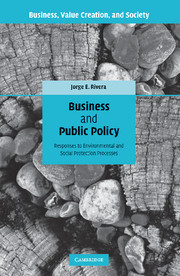Book contents
- Frontmatter
- Contents
- List of figures
- List of tables
- Foreword
- Acknowledgments
- Publication acknowledgments
- 1 Introduction
- 2 Business responses to the protective policy process in the US
- 3 Country context and the protective policy process–business response relationship
- 4 Firm-level characteristics and business responses to environmental/social protection demands
- 5 Is greener whiter? Resistance strategies by the US ski industry
- 6 Is greener whiter yet? Resistance or beyond-compliance by the US ski industry
- 7 Institutional pressures and proactive environmental protection: evidence from the Costa Rican hotel industry
- 8 Chief executive officers and proactive environmental protection: evidence from the Costa Rican hotel industry
- 9 Certified beyond-compliance and competitive advantage in developing countries
- 10 Conclusion
- References
- Index
10 - Conclusion
Published online by Cambridge University Press: 03 May 2011
- Frontmatter
- Contents
- List of figures
- List of tables
- Foreword
- Acknowledgments
- Publication acknowledgments
- 1 Introduction
- 2 Business responses to the protective policy process in the US
- 3 Country context and the protective policy process–business response relationship
- 4 Firm-level characteristics and business responses to environmental/social protection demands
- 5 Is greener whiter? Resistance strategies by the US ski industry
- 6 Is greener whiter yet? Resistance or beyond-compliance by the US ski industry
- 7 Institutional pressures and proactive environmental protection: evidence from the Costa Rican hotel industry
- 8 Chief executive officers and proactive environmental protection: evidence from the Costa Rican hotel industry
- 9 Certified beyond-compliance and competitive advantage in developing countries
- 10 Conclusion
- References
- Index
Summary
The argument that the external context plays a significant role in shaping the behavior and choices of individuals and organizations is the subject of very little controversy in the social sciences. Different streams of neo-institutional scholarship have indeed produced a vast literature emphasizing and explaining how external pressures, factors, and events affect decisionmaking and behavior. There is also little disagreement about the existence of stark differences between developing country contexts and those of industrialized nations. For instance, consider the large discrepancy between the total number of US Environmental Protection Agency (EPA) employees and its equivalent federal government agency in China. In 2005, the Chinese State Environmental Protection Administration had just 300 workers in Beijing and 100 more for the rest of the country, compared to 17,645 employees at the US EPA during the same year (Balfour, 2005: 122; US Office of Management and Budget, 2009). To be sure, these country disparities may be evident not only to social scientists examining regulatory agencies but also to ordinary travelers during a short stop-over in a developing country airport.
Yet, most neo-institutional work has been focused on industrialized nations, particularly the US. Thus, it assumes compliance as the taken-for-granted business response to environmental and social protection policies and regulations (called “protective” public policies and regulations throughout this book). A similar focus and assumption can be observed in the corporate political activity and corporate social responsibility scholarship examining business responses to protective public policies.
- Type
- Chapter
- Information
- Business and Public PolicyResponses to Environmental and Social Protection Processes, pp. 205 - 214Publisher: Cambridge University PressPrint publication year: 2010



